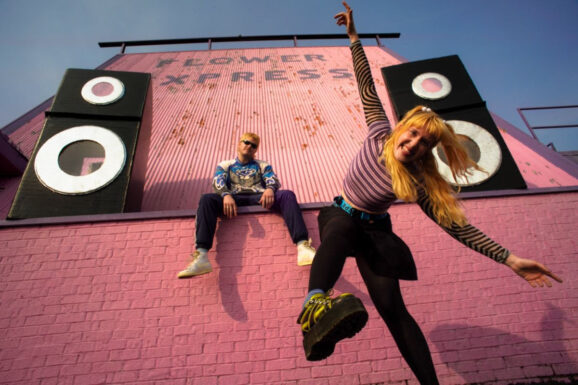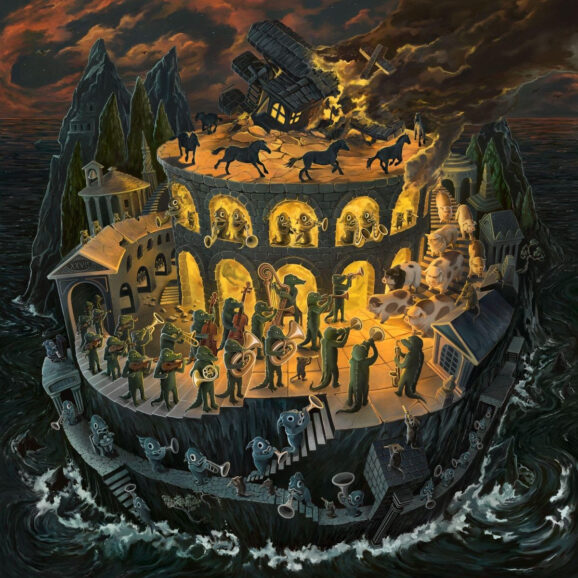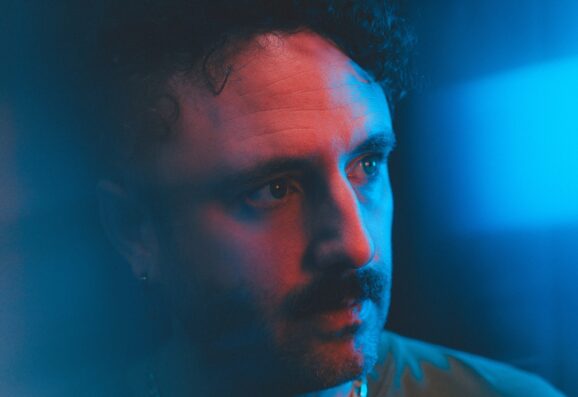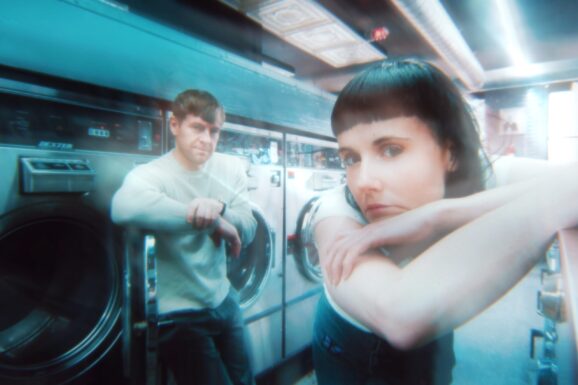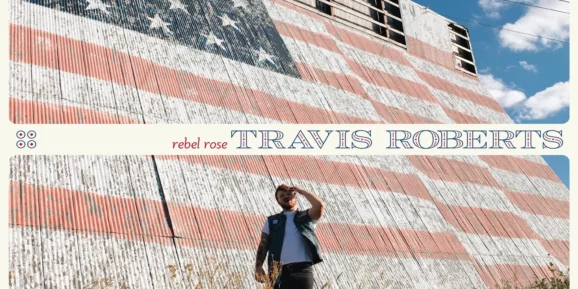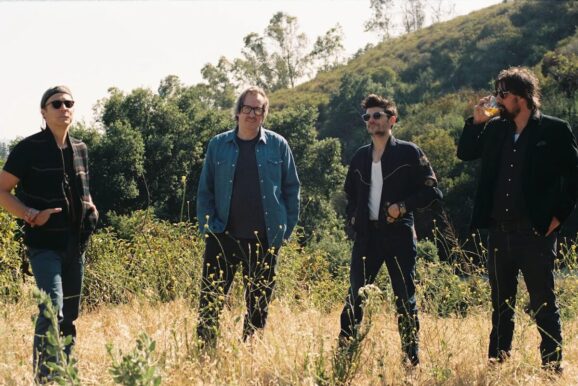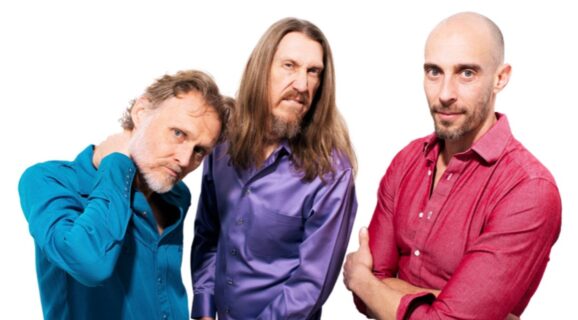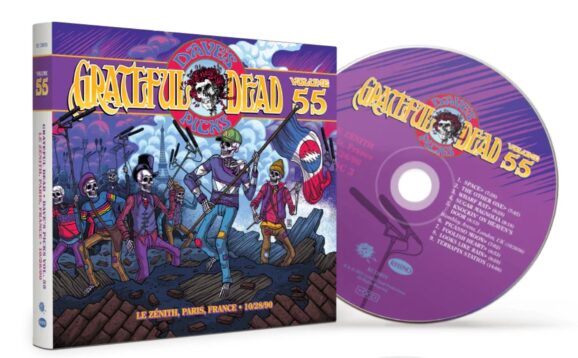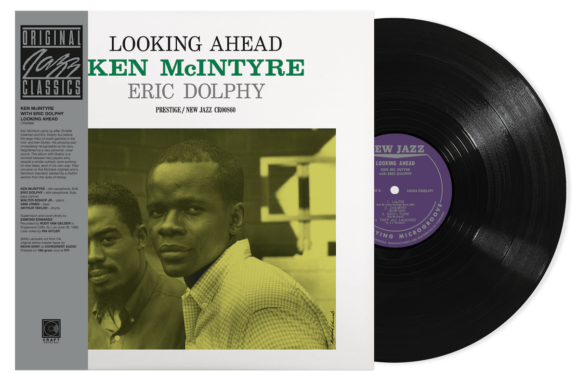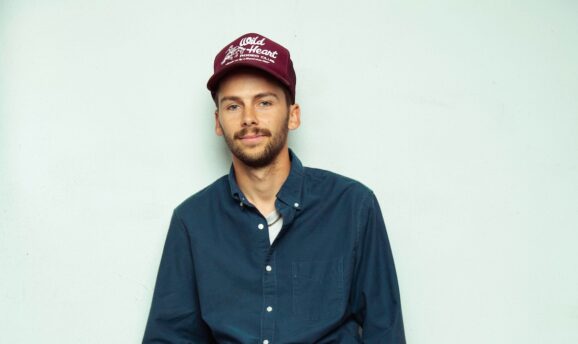Cory Branan released his new album, When I Go I Ghost, via Blue Elan on October 14th, as his first with that label. As ever, Branan stands at that crossroads of being a singer-songwriter and a genre-blind composer of albums, and the latest collection brings traditions together in such a finely crafted way, you’d have a hard time identifying their constituent elements. Another very entertaining choice on the album is combining some more solemn reflections and storytelling with emotive, high-energy movement in the music, which often seems to suggest that nothing is ever totally what it seems to be.
Cory Branan is joined on the album by Producer Jeremy Ferguson, drummer Eric Slick, bassist Robbie Crowell, Jarrad K on various keys and synthesizer, and Anthony da Costa on guitars and vocal harmonies. Together, they created an expansive, multi-layered sound that suggests the larger vistas that the restlessness and wanderlust of the album seeks out. I spoke to Cory Branan at a time when he was temporarily grounded by covid, but soon to hit the road for a slew of tour dates coming up. It was a conversation taking in a number of interesting dualities, including his crafting of studio songs versus his live performance life, his early inclinations towards both Metal and Country, and the dualities we find even in the songs of When I Go I Ghost.
Hannah Means-Shannon: You’ve been on the road a lot and you have a bunch more touring coming up. No trace of the famed “2022 Burnout” I keep hearing about?
Cory Branan: Oh, no. I toured earlier in the year, and did an early winter and a spring tour, so I actually have had a lot of the summer off, so I’m champing at the bit and ready to go. During covid, I have kids, so I had to hustle, so I learned how to record at the house, and I put out five cover projects that I recorded here. Whatever people requested, I’d do it. That downtime that everybody had was actually a lot of work for me.
HMS: I get the generally impression that the sound on this album is actually bigger and more layered than your other recent work, so it’s not even a basic album. You went all-out.
CB: I always hear the songs fleshed out. If I hear it, and it’s just me and a guitar, then I’ll record it like that. I’ve got some songs and records like that. The size of the record is actually a really interesting thing. I wanted everything to be to scale and have the instruments sound like the instruments. So I really emphasized that I wanted dry, 1970s drums. Conversely, the drums are actually tighter, and it leaves room for other things. It ends up sounding bigger. I thought that Jeremy Ferguson, the Producer, just crushed it, and of course, having Eric Slick on drums didn’t hurt!
HMS: I hear what you’re talking about. The instruments are all very distinct and you could probably hear all the parts from very far away.
CB: That’s all Jeremy! I don’t have a lot of rules for making an album, but I do all the planning and arrangements to the Nth degree, all in my head, then I get in there with really great and underprepared musicians. Hopefully we capture stuff. Jeremy is almost like a musician on that board. As we were cutting it, we’d go in and listen, and it sounded mixed already. His sonic choices made it look effortless. He makes choices on the floor, which is old-school. These days with Pro Tools, everyone fixes it later. It’s really satisfying.
HMS: Is live performance something you think about before recording?
CB: Never. I’m almost willful about it. Just to be able to have a career in this day and age, I tour solo 90% of the time. I’ll piece a band together for festival stuff but mostly I’m a solo artist. For me, the live show is one thing and I just hear these songs certain ways.
HMS: So the album is the real canvas for you?
CB: That’s what I like and I appreciate it. To be able to do this so long solo, I do have a thing that I do acoustically, but it’s very hard to capture because it’s temporal and it involves the room. It involves everything that’s happening right there disappearing. When you hear a recording of some shows, you can get a sense of it, but with my shows, you’d ask, “Why is this redneck yelling and then whispering?” [Laughs]
There’s interplay with the room that happens and it just doesn’t translate. In general, there’s something intangible about live music. I always court that. For my live shows, I’ve never made a setlist. I’ve never planned anything. I like to risk something, I guess. I’m not that interested in myself, so I have to stay interested in the music and the show. I like variables and the different potentials of things. So I play those songs differently all the time. I have more musical ambitions with an album.
HMS: For some musicians, live shows seem more like a theater performance where you have to keep that connection with the audience.
CB: There’s a palpable push and pull, like spinning plates in the air. I’ve never phoned in a show in my life and it’s a point of pride. That’s my only work aesthetic from my blue-collar background.
HMS: You seem to have always been someone who navigated many genres, and this album takes that to the next level, I feel. The genres are broken down so finely that you can’t find the edges. Did that way of thinking have a starting point for you or has it always been like that?
CB: It’s always been like that for me as a listener. I think that it comes from growing up in Mississippi and I grew up with traditional music, church music, Country, Bluegrass, and Blues. I also grew up with MTV though, as a suburb rat. We didn’t have record stores. Pop radio was glorious in 1984, but all the other music came piecemeal. I had a guy down the street who turned me on to Minor Threat and Iron Maiden. Everything came at you. MTV just opened things up. Nothing sounded alike.
As things went on, and we had more information coming at us, things start to break down. You get your Becks, and things that are more like “blender music”. It’s almost as if everything is remixed in their head before it even comes out. Society got more fractured like that, too. I respond to that, I guess. I try not to overthink this stuff too much because I like to try to hold onto the little magic that I can find in my life and leave it the fuck alone!
HMS: Absolutely. I’ve also been wondering if kids have to be told not to like things. I think if you can take that out of the equation, the way someone looks at music might turn out pretty differently. I very much agree about MTV and that had a shocking impact because whatever comes on next, you’re going to watch it.
CB: There were times where I only listened to one thing, since I was a Metal guitarist, but even then, that wasn’t totally true. I listened to George Jones when I was listening to Sepultura. I played in a Country band when I was playing in a Metal band.
HMS: Wow! That’s awesome.
CB: I have played guitar since I was 13 and I was an axe-swinger. I’d pick up Country gigs with my Metal guitar. I don’t think there were times in my life where I said, “This is the only thing for me.” There were focus periods once I did start writing songs in my 20s. I somehow missed the whole John Prine, Joni Mitchell thing until then, so I went to school at the shrine of some of the great songwriters. During that time, I might not have listened to anything with drums. I’d just keep finding things.
HMS: How did you pick which songs went on this record?
CB: I usually have a stack because it takes so long to record. They stack up. I immediately play them. People will know these songs. There are only three or four on this record that I haven’t played. The live thing changes how I feel about songs. It doesn’t usually change the lyric, but it will alter my vision of where the song’s strengths and weaknesses are. Also, since I don’t ever play the songs the same way live, it’ll make me think, “Maybe I should play it like this in the studio.” For a song like “Angels in the Details”, it was almost a Blues song as I wrote it. I tend to stay away from Blues because it’s kind of sacred, but it’s a Blues form. I kept it nebulous until we were in the studio, and then when Eric played the drums, I said, “Yep! That’s it!” I try to keep things open until I get into the studio.
HMS: Was audience reaction the main thing that impacted your choice?
CB: Thematically, there are some things that play on this record, and some songs seem kin to each other, so that was part of it, too. Some people who have been hearing me live may be upset at some songs that I didn’t put on this record. We also held back three tracks to make it fit on vinyl. Some songs don’t help the flow of the record, and I like a record to move a certain way, so I took some time with that. When I asked opinions about that at Blue Elan, they were forthcoming and engaged, and that was refreshing.
HMS: I have to ask you about “When In Rome, When In Memphis” because I live in New Jersey and I grew up partly in Memphis, so I’m getting a lot of those place references. It’s a really fun song, and of course, in there, we get the album title, “when I go I ghost”.
CB: Yes, I put that in later. It’s rhythmic, it’s almost like a nursery rhyme the way that I say it, and it fit, thematically. There’s a lot of hesitancy and wanderlust to the album, and restlessness. It also happens to be true because I’m terrible socially. I’ll be somewhere and I’ll just have to leave. The song itself is one that I actually wrote in Jersey on tour.
The gist of it is that someone is saying that they are fine anywhere and doesn’t need home because he has this memory. But he’s also lying to himself, because he goes on to elaborate that it’s just a memory. But it’s a simple banger of a tune, which I don’t want to clutter, so people don’t have to think of it like that. For me, it’s all there. I picked loaded places, like Asbury Park, and Memphis, which are as loaded as Rome, but there are also references to other places to balance things out.
HMS: For me, that also taps into music tradition and even the American obsession with road trips and travel by car. We get both of those in one song, which brings a lot of energy.
CB: Ideally, that’s what you want. One of the only other rules I had for this record was that the sadder the song was, the more I wanted it to groove or move. So the more emotional it was, or the more intellectual in places, the more it needed to be body music to balance things.
So one song that was pretty autobiographical, “That Look I Lost”, ends up getting the Motown treatment. It’s one of those things that a lot of old Soul music, like a lot of Blues, is so sad that it’s comforting, in a way. So you have this triumphant thing undercutting the sadness. I’ve always loved that when it happens in music, so that was a decision here.
HMS: One thing that happens when songs have subject matter that’s one way, and music that’s another, is you almost feel like you’re considering or looking at opposites and that experience makes you see them differently.
CB: Absolutely, it’s almost a dialectic that the song has with itself. Sometimes I have the character do that. I like to have music juxtaposed as opposed to supporting the theme. Randy Newman, a favorite of mine, is really good at it, or even John Prine. He has that midwestern, droll, comic lightness, and he plays these dark lyrics against that a lot. That’s an appealing juxtaposition for me.

